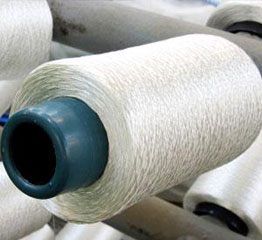Fiberglass yarn can possess high strength and resistance to heat and chemicals.
 One may argue that fiberglass, a silica based material, is a natural fiber, but fiberglass must be highly processed before it can be useful as a yarn. Fiberglass is very brittle and difficult to work with. It does not absorb water and has very low elongation.
One may argue that fiberglass, a silica based material, is a natural fiber, but fiberglass must be highly processed before it can be useful as a yarn. Fiberglass is very brittle and difficult to work with. It does not absorb water and has very low elongation.
Fiberglass yarn offers:
- High strength (when the fibers are in an oriented direction)
- Heat resistant
- Chemical resistant
- High (2.48 to 2.54 g/cc) densities
Technical Data
| Tenacity (g/denier) |
15.3 - 19.8 |
| Elongation at break (%) |
4.8 - 5.7 |
| Shrinkage at 177°C (%) |
N/A |
| Melting point (°F) |
Softens at 1,220 |
| In flame |
Softens, can change shape |
| After flame |
Hardens |
| Chemical resistance |
Fair resistance to acids and bases |
| Specific gravity (g/cc) |
2.49 |
| Moisture regain (%) |
None |
Disclaimer: Values are only a guide. Actual values depend on manufacturer and exact type of yarn. Please contact our engineering team for specific values as they relate to your application.
 One may argue that fiberglass, a silica based material, is a natural fiber, but fiberglass must be highly processed before it can be useful as a yarn. Fiberglass is very brittle and difficult to work with. It does not absorb water and has very low elongation.
One may argue that fiberglass, a silica based material, is a natural fiber, but fiberglass must be highly processed before it can be useful as a yarn. Fiberglass is very brittle and difficult to work with. It does not absorb water and has very low elongation.





